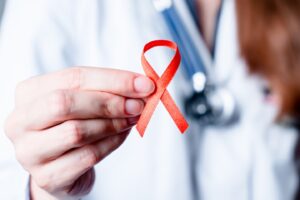World AIDS Day

Every year on December 1, we observe World AIDS Day. This day inspires people to raise awareness about the disease, debunk myths and work towards removing the social stigma surrounding the subject.
Acquired Immune Deficiency Syndrome (AIDS) is a life-threatening disease caused by the Human Immunodeficiency Virus (HIV), which is sexually transmitted. Once infected with the virus, it gradually weakens the immune system and makes the body more susceptible to multiple infections and cancers.
The first identified case of HIV dates back to 1959 in Congo, Central Africa. In India, AIDS was not reported until 1986, in Chennai, Tamil Nadu. As of 2020 however, India ranks second in the global cases of HIV, with more than 2 million infected individuals. South Africa leads in the number of HIV cases with a count of over 7 million.
Experts believe that the original bearers of this disease were the chimpanzees. Hunting and eating the meat of infected chimpanzees could have spread it to humans in Africa in the late 1800s.
Since the past several decades, there have been many myths surrounding the disease. These myths cause a social stigma and often make the lives of infected people even more difficult. One of the most common myths about AIDS is that it can spread through saliva, sweat, touching, and sharing toilets, food and drinks. AIDS can only spread through sexual contact, during pregnancy from the mother to the offspring and through sharing needles to inject drugs.
The Indian government established the National AIDS Committee (NAC) to reduce the cases of AIDS since it was first reported in India. Several programmes and schemes have been launched for the welfare of the patients such as the National AIDS Control Programme (NACP) and the HIV & AIDS (P & C) Act.
On this day, let’s focus on educating ourselves about the impacts of AIDS and aim towards making the world a more united place.

